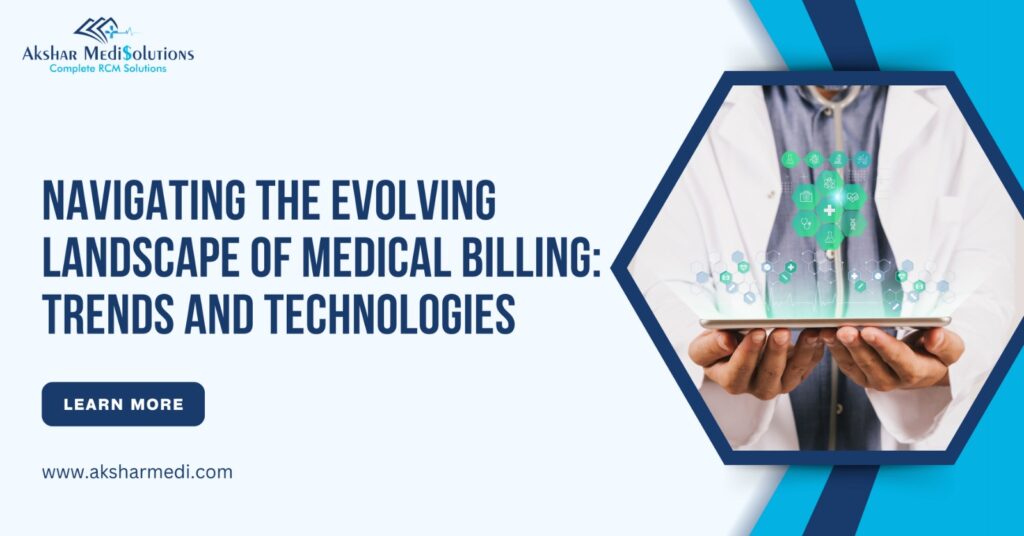Medical Coding and Medical billing are two core components of the healthcare industry. The process of assigning standardized code to diagnoses and procedures is coding, while the process of submitting claims to insurance companies for reimbursement is known as billing.
As an entrepreneur, regardless of whether you perform in-house billing or outsourcing it, with the evolving landscape of the industry, you need organizations to implement innovative billing practices to optimize the revenue cycle and improve operational efficiency.
Let’s Delve into and understand a few of the latest trends and technologies that work as a booster to sustain business.
Medical Billing Trends:
- Automation in Medical Billing:
- Discuss the increasing use of automation tools and software in medical billing processes.
- Benefits such as improved efficiency, reduced errors, and faster reimbursement cycles.
- Examples of automation technologies being adopted in the industry.
- Use of AI and ML:
- Explain how Artificial Intelligence (AI) and Machine Learning (ML) are revolutionizing medical billing.
- Applications of AI and ML in tasks like claims processing, coding, and fraud detection.
- Case studies highlighting successful implementations of AI and ML in medical billing.
- Cloud-Based Medical Billing Solutions:
- Explore the advantages of cloud-based solutions for medical billing.
- Scalability, accessibility, and cost-effectiveness compared to traditional on-premise systems.
- Popular cloud-based medical billing platforms and their features.
- Outsourcing Medical Billing Services:
- Discuss the trend of outsourcing medical billing to specialized firms.
- Benefits such as cost savings, expertise, and focus on core healthcare operations.
- Considerations when selecting outsourcing partners and managing relationships.
- Patient-Centric Medical Billing
- Highlight the shift towards patient-centric billing practices.
- Importance of transparent billing, easy-to-understand statements, and patient support.
- Tools and strategies for enhancing the patient billing experience.
Technologies in Medical Billing:
- Electronic Health Records (EHRs):
- Overview of EHR systems and their integration with medical billing processes.
- Advantages such as centralized patient data, streamlined workflows, and compliance benefits.
- Challenges and considerations in implementing and optimizing EHRs for billing purposes.
- Blockchain Technology:
- Explore the potential of blockchain for secure and transparent medical billing transactions.
- Concepts like decentralized ledgers, smart contracts, and data integrity.
- Pilot projects and initiatives utilizing blockchain in healthcare billing.
- Telemedicine:
- Discuss the role of telemedicine in expanding access to healthcare and billing implications.
- Billing codes and reimbursement policies related to telehealth services.
- Challenges and opportunities in integrating telemedicine with existing billing systems.
- Wearable Technology:
- Explore the impact of wearable devices on remote patient monitoring and billing.
- Billing considerations for data collected from wearable sensors and devices.
- Examples of wearable technology applications in chronic disease management and preventive care.
Future of Medical Billing:
- Predictive Analytics in Medical Billing:
- Explain how predictive analytics can optimize billing processes and revenue cycle management.
- Predicting reimbursement trends, identifying payment patterns, and reducing denials.
- Tools and techniques for implementing predictive analytics in medical billing operations.
- Integration of Healthcare Systems:
- Discuss the importance of interoperability and data exchange between healthcare systems.
- Benefits of integrated billing and clinical systems for efficiency and accuracy.
- Challenges and strategies for achieving seamless integration across diverse healthcare platforms.
- Use of Chatbots in Medical Billing:
- Explore the role of chatbots in automating patient inquiries, claims status checks, and billing support.
- Benefits such as 24/7 availability, cost savings, and improved patient satisfaction.
- Considerations for implementing chatbots in medical billing workflows.
- Augmented Reality (AR) and Virtual Reality (VR) in Medical Billing:
- Explore emerging technologies like AR and VR and their potential applications in medical billing.
- Visualizing billing data, training simulations, and immersive experiences for billing education.
- Pilot projects and future prospects for AR and VR integration in healthcare finance.
Challenges and Solutions in Medical Billing:
- Data Privacy and Security:
- Discuss the importance of safeguarding patient information in medical billing processes.
- Compliance with HIPAA regulations, encryption methods, and cybersecurity best practices.
- Strategies for mitigating data breaches and ensuring patient confidentiality.
- Regulatory Compliance:
- Overview of regulatory frameworks governing medical billing practices.
- Recent changes in healthcare laws and their impact on billing requirements.
- Compliance challenges and strategies for staying updated with regulatory changes.
- Staffing and Training:
- Importance of skilled personnel and ongoing training in medical billing roles.
- Recruiting strategies, professional certifications, and continuing education opportunities.
- Addressing staffing shortages and turnover in the medical billing workforce.
- Cost of Technology Implementation:
- Considerations for budgeting and ROI analysis when investing in medical billing technologies.
- Total cost of ownership (TCO), vendor selection criteria, and negotiation strategies.
- Cost-saving measures and potential sources of funding for technology upgrades.
In a nutshell, new trends and technologies play a pivotal role in reshaping the medical billing landscape. Whether you are a healthcare provider, doctor or clinic, understanding intricacies and potentially staying strong with these adaptations is key to sustaining and ensuring accurate claim submission and reimbursement.
Though automation has enhanced the billing process, human intervention is a crucial key to it. Outsourcing your process of billing offers valuable expertise by your side, someone who is navigating regulators’ changes, addressing unique scenarios, negotiation with insurers and maximising revenue.
Let us handle your medical billing and coding process while you focus on your customers. Call us and get help.

